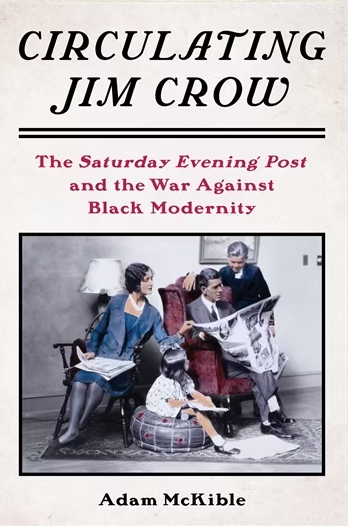
In American media history, the Saturday Evening Post, often celebrated for its nostalgic portrayal of American life, undergoes a critical analysis in the groundbreaking book “Circulating Jim Crow: The Saturday Evening Post and the War Against Black Modernity” by Dr. Adam McKible, associate professor of English at John Jay College. This study challenges the idealized image of the iconic publication, exposing its deep connections to racist ideologies during the Jim Crow era, contrary to the widely held belief that the magazine offered an uncomplicated reflection of American life.
The book begins with Dr. McKible exploring the career of George Horace Lorimer, an editor who propelled the Saturday Evening Post to prominence during the modernist era and established the magazine’s remarkable influence. With a readership in the millions, the magazine played a pivotal role in shaping public opinion and influencing households across the nation. Under Lorimer’s editorship, the magazine fueled anti-immigration sentiments by promoting nativist politics and racial pseudoscience, contributing to policies that closed the nation’s borders to immigrants from diverse regions, including southern and eastern Europe, Africa, Asia, and the Caribbean.
“The magazine under Lorimer was very involved in ginning up anti-immigrant sentiment in America and making Americans suspicious of other Americans based on their racial origin,” said Dr. Mckible in an interview with John Jay Research.
 Focusing on the Harlem Renaissance, Dr. McKible’s research also exposes how the Saturday Evening Post portrayed African Americans and responded to changes in Black American life during the Harlem Renaissance. He unveils the magazine’s subtle but insidious approach to addressing the era’s transformations, coining the phrase “register and re-contain” to describe how the magazine acknowledged black achievements only to undermine them through racist stereotyping.
Focusing on the Harlem Renaissance, Dr. McKible’s research also exposes how the Saturday Evening Post portrayed African Americans and responded to changes in Black American life during the Harlem Renaissance. He unveils the magazine’s subtle but insidious approach to addressing the era’s transformations, coining the phrase “register and re-contain” to describe how the magazine acknowledged black achievements only to undermine them through racist stereotyping.
Dr. McKible’s findings reveal that despite recognizing the emergence of black modernity, the magazine consistently endeavored to restrain and belittle black accomplishments, transforming them into subjects of ridicule or disregard. This dismissive approach extended to influential figures such as Booker T. Washington and other black leaders during the Harlem Renaissance, as the Saturday Evening Post downplayed their contributions.
In response, black writers resisted the magazine’s narratives by taking aim at the white writers who were widely recognized as Saturday Evening Post authors. By naming such figures, as famous Post authors as Octavus Roy Cohen and Irvin S. Cobb, Harlem Renaissance writers signaled their displeasure with and resistance to the caricatures and stereotypes perpetuated by Lorimer’s magazine.
“With the help of the Saturday Evening Post, America took on the work of establishing Jim Crow, legally and culturally. These were not legal efforts but instead cultural maneuvers designed to denigrate, demean and dismiss black humanity, to take back everything that happened during Reconstruction and destroy it,” says Dr. Mckible in an interview.
Expanding the history to contemporary implications, Dr. McKible emphasizes the importance of truth-telling, challenging nostalgia, recognizing that America’s history is fraught with complexities, and acknowledging the deep-rooted racial inequalities that persist.
“The contemporary media should always tell the truth,” Dr. Mckible emphasizes.
Dr. McKible’s groundbreaking research redefines our understanding of the Saturday Evening Post and contributes to contemporary discussions about media responsibility, representation, and the ongoing struggle for racial equality.
Read about Dr. McKible’s Research here.



Recent Comments